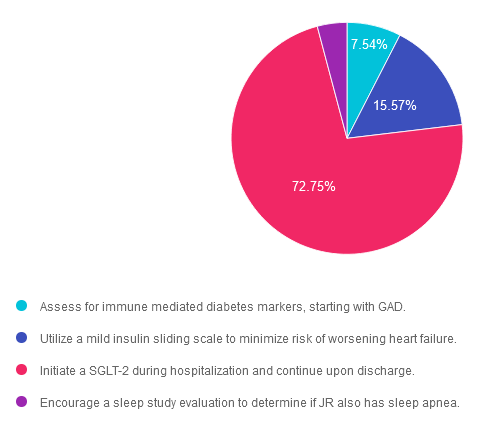
For last week’s practice question, we quizzed participants on the best treatment for hospitals & heart failure. 73% of respondents chose the best answer. We want to clarify and share this important information, so you can pass it on to people living with diabetes and your colleagues, plus prepare for exam success!
Before we start though, if you don’t want any spoilers and haven’t tried the question yet, you can answer it below: Answer Question
Question: JR has newly discovered type 2 diabetes and is admitted to the hospital with heart failure. Their A1C is 7.9% with negative ketones and a GFR greater than 90 mg/g.
According to the 2024 ADA Standards of Care, which of the following is a recommended intervention during JR’s hospital stay?
Answer Choices:
- Assess for immune mediated diabetes markers, starting with GAD.
- Utilize a mild insulin sliding scale to minimize risk of worsening heart failure.
- Initiate a SGLT-2 during hospitalization and continue upon discharge.
- Encourage a sleep study evaluation to determine if JR also has sleep apnea.

Getting to the Best Answer
If you are thinking about taking the certification exam, this practice test question will set you up for success. Test writers anticipate possible answers based on the details in the question. They will wave those “juicy answers” right under your nose. Your job is to weed through the particulars, pluck out the most important elements and choose the BEST answer.
Answer 1 is incorrect. 7.54% chose this answer. “Assess for immune mediated diabetes markers, starting with GAD.” Given that JR’s A1C is 7.9% and their ketones are negative, it seems unlikely they might have undiscovered immune mediated diabetes. The most pressing issue in addition to their diabetes is addressing the CHF.
Answer 2 is incorrect. 15.57% of you chose this answer. “Utilize a mild insulin sliding scale to minimize risk of worsening heart failure.” Based on the ADA Standards of care, insulin sliding scale as the only treatment approach is not recommended. In addition, insulin therapy doesn’t aggravate heart failure.
Answer 3 is correct. About 72.75% of respondents chose this. “Initiate a SGLT-2 during hospitalization and continue upon discharge.” YES, this is the best answer. Given that JR has diabetes and heart failure, using a SGLT-2 will lower their blood sugar plus provide a “glucoretic” effect, which will promote diuresis.
Finally, Answer 4 is incorrect. 4.14% chose this answer. “Encourage a sleep study evaluation to determine if JR also has sleep apnea.” From the information provided, there is no indication that JR is experiencing sleep apnea. The most pressing issues are the CHF and new diabetes diagnosis.
We hope you appreciate this week’s rationale! Thank you so much for taking the time to answer our Question of the Week and participate in this fun learning activity!
Want to learn more about this question?
Enroll in our ADA Standards of Care Update
Airs live today, February 1st, 2024, at 11:30 am PT

Objectives:
- A review of changes & updates to the annual ADA Standards of Medical Care in Diabetes.
- Identification of key elements of the position statement.
- Discussion of how diabetes educators can apply this information in their clinical setting.
Intended Audience: This course is a knowledge-based activity designed for individuals or groups of diabetes professionals, including RNs, RDs, Pharmacists, Nurse Practitioners, Clinical Nurse Specialists, Physician Assistants, and other healthcare providers interested in staying up to date on current practices of care for people with prediabetes, diabetes, and other related conditions.
Can’t make it live? No worries. We will send post the recorded version to the Online University within 24 hours of the broadcast
Instructor: Beverly Thomassian RN, MPH, CDCES, has been Board Certified in Advanced Diabetes Management for over 20 years. She is an Associate Clinical Professor at UCSF, a working educator, and a nationally recognized diabetes expert. She has a Master’s Degree in Public Health from UCLA, with a focus on behavioral health and education.
Sign up for Diabetes Blog Bytes – we post one daily Blog Byte from Monday to Friday. And of course, Tuesday is our Question of the Week. It’s Informative and FREE! Sign up below!
Accreditation: Diabetes Education Services is an approved provider by the California Board of Registered Nursing, Provider 12640, and our CPEU courses have received Prior Approval* from the Commission of Dietetic Registration (CDR), Provider DI002. Since our CPEU courses received Prior approval* from the CDR, these CPEU courses satisfy the CE requirements for the CDCES /BC-ADM regardless of your profession!
The use of DES products does not guarantee the successful passage of the certification exam. CBDCE and ADCES do not endorse any preparatory or review materials for the CDCES or BC-ADM exams, except for those published by CBDCE & ADCES.


